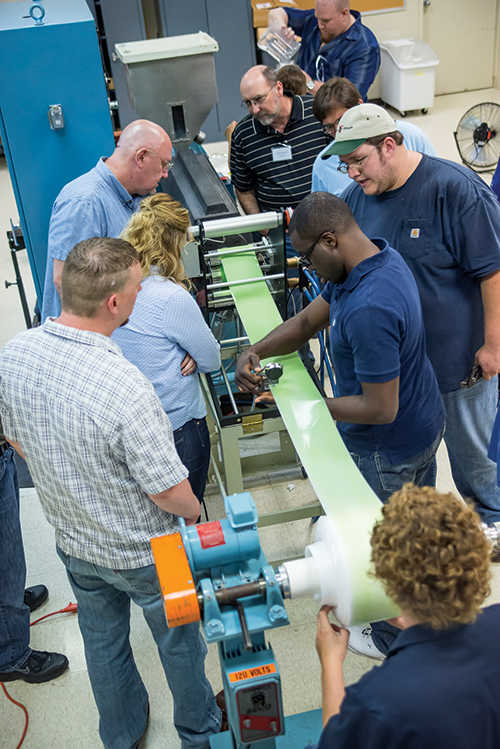t’s no secret that plastics is a big industry in the Keystone State. One of the most significant issues facing the plastics industry is the need for employee understanding of plastics technology. Pennsylvania has several colleges and universities that supply highly trained graduates with degrees in plastics and polymer engineering technology. Programs for specialized plastics and chemical training are offered in Allegheny, Centre, Lehigh, Lycoming and Philadelphia.
I
Two well-known plastics programs are the Plastics Institute at Pennsylvania College of Technology and the Plastics Training Academy, which is a part of Pennsylvania State University Erie at Behrend College. Both programs supply students with the tools they need to be innovators in the plastics industry.
Plastics and Polymer Technology at Pennsylvania College of Technology (Penn College) is one of only five plastics programs in the nation that is recognized by the Accreditation Board for Engineering and Technology. The program earned this endorsement because of the department’s extensive array of industrial-size plastics processing equipment, modern laboratory facilities, highly credentialed faculty with real-world experience and a comprehensive curriculum that balances classroom with hands-on learning.
The program offers an Associate of Applied Science in Plastics and Polymer Technology and a Bachelor of Science in Plastics and Polymer Engineering Technology. “At the Penn College of Technology, we believe in hands-on education — degrees that work,” says Hank White, director of the Plastics Innovation & Resource Center at Penn College. “The best preparation for a successful career is a learning environment emphasizing applied, real-world instruction. They provide experiential learning in small classes and labs with state-of-the-art equipment, mentored by skilled faculty with business and industry experience.”
Customized Training
The Plastics Innovation & Resource Center (PIRC) at Penn College is an independent research, development and continuing education center that has become one of the top plastics technology centers in the nation. Unlike similar programs, the PIRC has access to industrial scale equipment and infrastructure dedicated to hands-on continuing education and industry-focused development programs.
“The PIRC provides customized training at company sites to help employees become more effective in the workplace,” says White. “A business grows and profits when its employees are constantly increasing their knowledge and experience.”
 “The best preparation for a successful career is a learning environment emphasizing applied, real-world instruction.”
“The best preparation for a successful career is a learning environment emphasizing applied, real-world instruction.”
— Hank White, director of the Plastics Innovation & Resource Center at Penn College
The Plastics Training Academy (PTA) started in 2005, and was designed to give short-term workshops for employees in the industry. “The goal is to increase and disseminate the knowledge we have to assist businesses become more efficient and prosper,” says Gary F. Smith, assistant professor of engineering in Plastics Engineering Technology at Penn State Erie, The Behrend College. “We get a lot of people from local industry, from the state and throughout the country. I have had people from California, Texas, North Carolina and Alabama recently.”
The programs at PTA are designed to give short-term, hands-on workshops throughout the industry. These can benefit both those who are new to the plastics industry as well as a seasoned worker. The nationally accredited institution features a state-of the-art plastics laboratory and covers everything from injection molding principles to part design principles.
“We cover all the fundamentals — processing (injection molding focus), materials and polymer fundamentals, and design,” says Smith. “In terms of partnering with private industry from a PTA framework we can customize training to provide on-site programs for their workforce. The workshops being offered by the PTA are designed to cover the needs of the industry.”
And those needs are lofty. The payroll for plastics related industries in the state is $60 billion. Gross product shipments in plastics are over $16.6 billion, which is 4.3 percent of national plastics shipments. As the third largest producer of natural gas in the nation, Pennsylvania is perfectly positioned to attract companies producing plastics and polymers, and having the educated workforce makes the state that much more attractive.
“Employees that quickly recognize and correct problems are far more valuable than someone with only a surface understanding of their job,” says White. “The goal is to produce exemplary employees allowing the plastics industry to significantly increase its efficiency and competitiveness in the world marketplace.”
